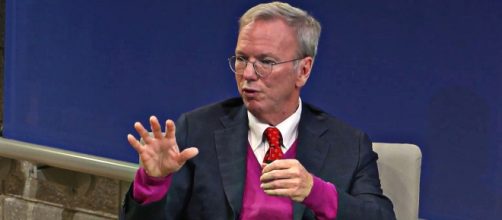The U.S. is rapidly losing its lead over China in technology, according to former Google CEO Eric Schmidt. He addressed the rivalry between the two countries in testimony before the U.S. Senate Committee on Armed Services on February 23. Schmidt's 13-page written testimony and a video of the entire hearing on Emerging Technologies and Their Impact on National Security can be found at the committee's website armed-services.senate.gov.
Artificial Intelligence (AI) was at the center of the competition between China and the U.S., he said. Schmidt told the committee "China is an AI peer" and "in certain applications" its technology was superior.
"Within the next decade, China could surpass the United States as the world’s AI superpower," he said. The U.S. should strive "to stay at least two generations ahead of China in state-of-the-art microelectronics," Schmidt stressed.
Schmidt said "the threat of Chinese leadership in key technology areas is a national crisis" that had "to be dealt with directly, now." Schmidt said he agreed with President Joe Biden that the U.S. was in a “long-term strategic competition with China.” That assessment had been expressed by Biden at the 2021 Virtual Munich Security Conference on February 19.
Upcoming report on artificial intelligence
Schmidt is the chairman of the National Security Commission on Artificial Intelligence.
Schmidt said the commission’s final report would contain “many critical recommendations to win the global technology competition and strengthen national defense.” The report is scheduled to be posted at www.nscai.gov/event/2021-final-report on March 1. Schmidt made it clear to the Senators on the committee that he was giving them his own personal opinions and not those of the commission.
Dependence on foreign semiconductors
Schmidt noted that the U.S. relied almost completely on foreign sources for its semiconductors. The supply chains were vulnerable to disruptions caused by natural disasters or decisions by foreign leaders, he said. China was investing heavily in efforts to rival Taiwan and South Korea as producers of semiconductors by 2030, he added.
"If a potential adversary bests the United States in semiconductors, it could gain the upper hand in every domain of warfare," Schmidt warned.
Synthetic biotechnology, quantum computing, and fifth-generation (5G) networks were other areas in which China was working to achieve world leadership, he said. The American private sector played an important role in innovation, but the largest American tech companies did not have the resources of the Chinese government, Schmidt said, stressing that it was necessary to have "a hybrid approach that more tightly aligns government and private sector efforts."
Schmidt - technology competitiveness council
One of the recommendations which Schmidt made was the creation of a Technology Competitiveness Council, headed by the Vice President.
The council would better enable the President "to develop, drive and fund a real national technology strategy," he said.
In its coverage of the hearing, the South China Morning Post (SCMP) said China’s rapid progress in developing AI had been made possible, in part, by support from the Chinese government. The goal of the government’s Next Generation Artificial Intelligence Development Plan was for China to become a leading power in AI by 2030.
Ex-Google CEO Eric Schmidt stresses ‘urgency’ in countering China on artificial intelligence as US-China tech war continues https://t.co/PtaVUnNxGP
— SCMP News (@SCMPNews) February 23, 2021

